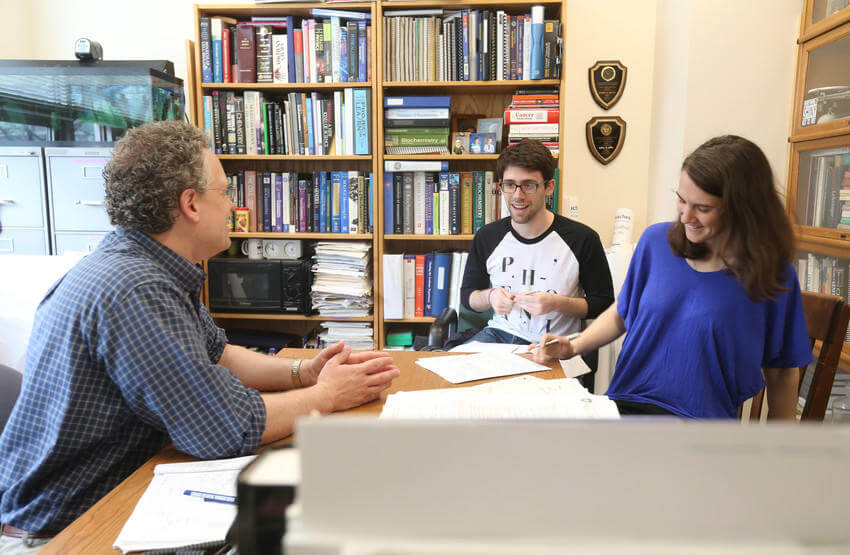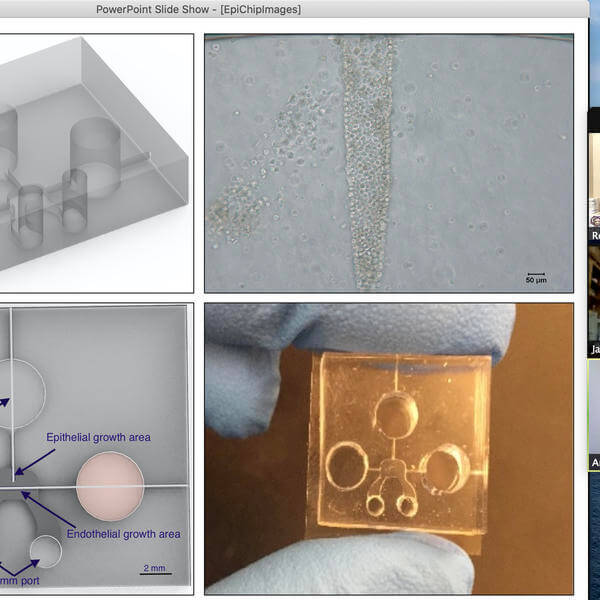When biology major Anh Phan ’21 was a sophomore at the College of the Holy Cross, she was looking for “a way to apply my knowledge to real-life science,” and Professor Robert Bellin’s breast cancer research lab proved to be the perfect fit. Bellin is using an innovative device, a chip the size of a postage stamp, to create 3-D models that replicate the environment in a mammary gland, where breast cancer tumors can form.
Phan had already worked on breast cancer research at UMass Medical School in Worcester and, after taking cell biology, microbiology and biochemistry at Holy Cross, said she wanted to “apply what I learned in the classroom to research.”
Phan has worked alongside Bellin, a professor of biology, since her junior year. His lab is staffed by Phan and three other Holy Cross students, who are working on a project to discover which circumstances in the mammary gland cause tumors to grow, and why some breast cancers grow more aggressively and are harder to treat. The postage stamp-sized device they are using, called the EpiChip, was developed by The Chen Lab in the biomedical engineering department at Boston University, where Bellin has conducted research while on sabbatical from Holy Cross. This type of chip is an alternative to studying disease models in animals and allows the researchers to replicate the human body more accurately.
Their hypothesis is that the presence of a certain protein, syndecan-1, promotes tumor formation in the mammary gland, so they are using the EpiChip to create replica glands both with and without the presence of the protein. If they find that the protein does promote tumors to form, that could lead to further testing on how to block this protein and, ideally, slow or prevent the development of certain kinds of breast cancer.
And while Bellin is working alongside undergraduates in these efforts, he points out the student researchers are doing graduate-level work.

“It’s a really interesting research environment, and one that I really enjoy working in, because we don’t have graduate students and post-doc researchers working in our research laboratories. In most biomedical sciences laboratories, undergraduates tend to be primarily in an assistant role. But all our labs at Holy Cross are staffed by undergraduates and they are the primary researchers working with faculty members,” Bellin said. “I structure my lab so they are in roles that would be equivalent to what a graduate student would be doing in graduate school.”
That was one of the reasons Jason Cunha ’21, a biology major from Hudson, Massachusetts, was interested in Bellin’s research team. Cunha wants to work in a biomedical research laboratory after graduation and then apply to graduate school. While he hasn’t settled on what he will study, Cunha is interested in continuing to work with “disease on a chip” models like the one he is using in Bellin’s lab, and feels well-prepared for whatever comes next, thanks to his research experience at Holy Cross.
“My experience in Professor Bellin's lab has been phenomenal. I have found that maintaining a close-knit and transparent working relationship with lab members is imperative to long-term success in the lab,” Cunha said. “Professor Bellin is by far one of the best academic and professional mentors I have had at Holy Cross. He always makes time to listen to all lab members' comments and concerns, and he will use his extensive experience and reassurance to guide us through any challenging or unfamiliar tasks.”


